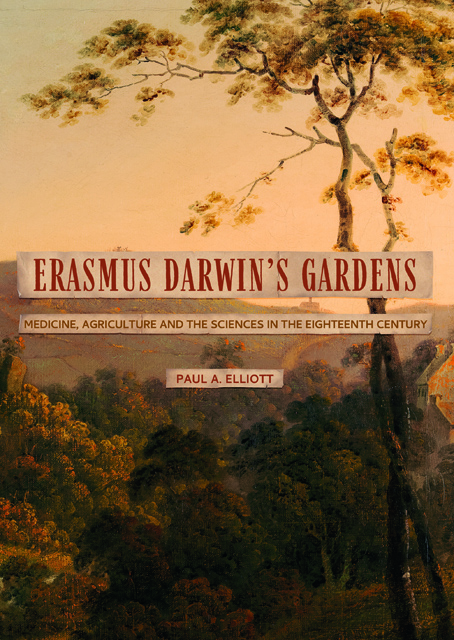Book contents
- Frontmatter
- Contents
- List of Figures
- Acknowledgements
- A Note on Plant Names and Identification
- Introduction
- 1 Lichfield and Derby Gardens
- 2 Medicinal Plants and Their Places
- 3 Agricultural Improvement: Enclosure and the Application of Science and Technology
- 4 Vegetable Physiology, Technology and Agriculture
- 5 Vegetable Pathology and Medicine
- 6 Among the Animals
- 7 Animal Diseases
- 8 ‘Eating of the Tree of Knowledge’: Forestry, Arboriculture and Medicine
- 9 Trees in the Economy Of Nature
- Conclusion
- Select Bibliography
- Index
- Garden and Landscape History
8 - ‘Eating of the Tree of Knowledge’: Forestry, Arboriculture and Medicine
Published online by Cambridge University Press: 14 January 2023
- Frontmatter
- Contents
- List of Figures
- Acknowledgements
- A Note on Plant Names and Identification
- Introduction
- 1 Lichfield and Derby Gardens
- 2 Medicinal Plants and Their Places
- 3 Agricultural Improvement: Enclosure and the Application of Science and Technology
- 4 Vegetable Physiology, Technology and Agriculture
- 5 Vegetable Pathology and Medicine
- 6 Among the Animals
- 7 Animal Diseases
- 8 ‘Eating of the Tree of Knowledge’: Forestry, Arboriculture and Medicine
- 9 Trees in the Economy Of Nature
- Conclusion
- Select Bibliography
- Index
- Garden and Landscape History
Summary
Despite the profound importance of Erasmus Darwin’s many different encounters with trees and the numerous scholarly studies of his botany and his literary portrayals of the natural world, evolutionary ideas and the midlands social, agricultural and industrial milieu, there has never been a study of his work on trees and the impact of arboriculture upon his ideas. In many ways this is equally true for his grandson Charles Darwin (1809–1882), whose analyses of trees have also been neglected, even in studies of the place of botany in his evolutionary theories, despite the long section on trees and fruits in The Variation of Animals and Plants under Domestication (1875). Tom Williamson has emphasised how much work has been undertaken on aristocratic perspectives on arboriculture in the ‘long’ eighteenth century compared with those of the ‘wider population’, and a consideration of Darwin’s approach to silviculture and that of his close circle of friends and tree admirers will help to address this gap in our understanding. Like his Nottinghamshire contemporary Major Hayman Rooke (1723–1806), many of Erasmus Darwin’s tree encounters were inspired by the economic utility of agricultural and horticultural improvement as well as a love of arboriculture; however, Darwin was able to unite, as his friend Anna Seward claimed, practical botany with picturesque landscapes by creating and experiencing both planted and poetical botanic gardens. Darwin’s romantic appreciation of landscape beauty was founded upon the interrelationship between a picturesque understanding of trees and plants and his botanical, psychological and physiological theories, which he utilised to weave value and meaning into local environments. Hence it was local tree places (and amorous joy) that inspired him to express himself poetically for the first time since his student days as he personified the spirits of a grove in his garden under threat from the axe. Just as Seward was motivated by threats to Lichfield trees to intervene to try and save them, so similar circumstances provided an opportunity and impetus for her friend Darwin to assert their centrality in defining layers of landscape beauty, value and meaning as animate beings of fixity and longevity. However, Darwin’s arbophilia also stemmed from a general interest in tree botany and physiology within his literary circle, represented by the work of close friends such as Brooke Boothby, Thomas Gisborne and Francis Noel Clarke Mundy.
- Type
- Chapter
- Information
- Erasmus Darwin's GardensMedicine, Agriculture and the Sciences in the Eighteenth Century, pp. 225 - 260Publisher: Boydell & BrewerPrint publication year: 2021



